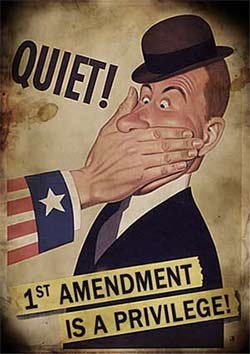A spat of articles have appeared in the Argus-Dispatch in the last couple of weeks concerned with the issue of campaign finance reform — the First Amendment, money and politics. They have been occasioned by the recent Supreme Court Case, McCutcheon vs FEC, handed down April 2. The decision struck down limits on the aggregate amount of campaign contributions a donor can give to all parties and candidates. The case did not affect the limitation on how much that same contributor can give to a single federal candidate. Those limits remain at $26oo for a primary and $2600 for the general election. See our related article here.
Of the four full length opinion columns in the A-D, three were from their regular syndicated sources and a fourth was a guest editorial. Two criticized the courts ruling in McCutcheon and the earlier and seminal Citizens United case. The supposedly somewhat libertarian professor Dan Lee of Augustana College locally, criticized the decisions as did local guest columnist John W. Smith. Not reviewed for this posting, but we would be willing to bet the farm that they are the same, are the views of long time A-D columnist Don Wooten.
The critics of these First Amendment protective decisions are working to maintain the relative power of incumbents, unions and liberal big media to determine election outcomes, and deny other collections of citizens their ability to compete.
Nationally syndicated columnist Charles Krauthammer’s column this week was supportive of McCutcheon but lamented how zealots have used disclosure requirements to identify and threaten contributors to various campaigns they dislike. The most recent high profile example being the left’s intimidation of Mozilla. An executive there gave $1000 to the referendum campaign in California several years ago which sustained the traditional definition of marriage. Mozilla rolled over for the left, agitated by the “gay mafia.” The executive was forced to retire.
Krauthammer seemed to have sympathy for Justice Thomas views which supported the conservative majority opinion in McCutcheon but dissented in part regarding disclosure requirements not being a threat to free speech.
We think disclosure abuses could self correct, as it is a weapon that either side to a campaign can pick up. There should have been an organized effort to counter-threaten Mozilla from the right and protect free speech. That corporations or the wealthy with business interests might shy away from donations to politics because of the boycott factor would also seem to take away the phoney argument of critics of Citizens and McCutcheon that they render ordinary folks powerless against “big money.”
That the left will more often be successful in such efforts with the aid of biased media narratives we do not dispute. But it is a possibility donors will have to live with as we do not think it reason to end disclosure. We have not heard of any alternative reform methodology that sufficiently protects all interests.
The fourth campaign speech related article in the A-D in recent days was authored by retired Illinois Circuit Judge John Donald O’Shea. He prepared the clearest explanation of the Citizens United case we have come across and highly recommend the entire article to you. Excerpts follow:
What liberals have made no effort to understand is that while PAC corporations and media corporations were allowed to “speak” . . . business corporations and unions were prohibited from speaking (from making expenditures for “electioneering communication” or for speech “expressly advocating the election or defeat of a candidate”) at any time. The Supreme Court simply held that business corporations, and unions, have the same political rights under the First Amendment as corporate PACs.
The court noted that media corporations (radio, TV and cable) have “immense aggregations of wealth,” accumulated “with the help of the corporate form.” The court’s holding gives non-media corporations the same right of free speech as media corporations. In doing so, the court noted the perversity . . .
In a country where special interest groups can use their wealth and speak on behalf of candidates who promise to pass laws to ameliorate perceived “corporate excesses,” corporations must be able to speak to defend themselves, and to oppose candidates and legislation that they see as destructive of their interests and the public interest. If the President can vilify corporations, the First Amendment ” requires that they have an equal right to vilify him.
If you think that liberal media does not continue to dominate the discussion narrative of the issue, regardless of the A-D’s somewhat better balance in the last few weeks, consider the following. In researching this article we did a Google search using the term McCutcheon. We scanned the first ten pages of results.
The relevant links listed (not in order) were: Slate — The Atlantic — The New Yorker — Time — Sunlight Foundation — Salon — Common Cause — New York Times — Brennan Center — Bill Moyers.com — Public Campaign — Huffington Post — Unlimited Corruption.com — Real Clear Politics — Fight Against McCutcheon.com — Demos — NPR — The Nation — Robert Reich.org and a blog entry in blogSeattleTimes.com. Each of the articles linked to were critical of the decision.
The only publications linked to in those ten pages arguing favorably of McCutcheon were a Forbes article, a link to a Jeff Jacoby article in the Boston Globe, and one link to National Review. There were perhaps three or four links to arguably neutral explanations of the decision including Wikipedia and the SCOTUS Web site. This could imply something about Google’s search manipulations as well. R Mall

